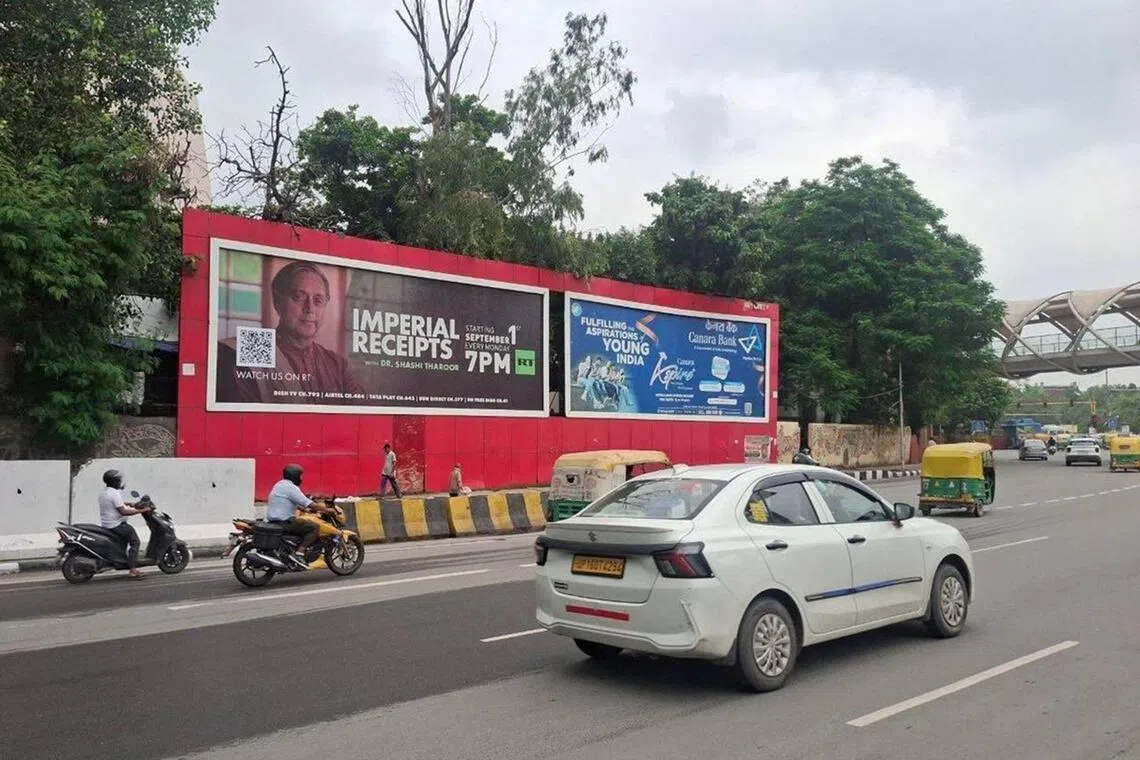Russian state TV taps anti-colonialism narrative in India as part of pro-Kremlin media push
Sign up now: Get insights on Asia's fast-moving developments

Advertisements promoting RT’s anti-colonial show Imperial Receipts featuring politician Shashi Tharoor popped up in Indian cities.
PHOTO: SHASHITHAROOR/X
Follow topic:
NEW DELHI – In August, advertisements on hoardings featuring Dr Shashi Tharoor, a well-known Indian opposition politician and author, popped up at prominent locations in Indian cities. His well-groomed face was also splashed across newspapers in promotional pitches.
However, the Indian National Congress – Dr Tharoor’s party – did not place these ads. They were put up by RT, a Russian state media entity, ahead of the Sept 1 debut of its high-profile anti-colonial weekly series, Imperial Receipts.
Known for his scholarship on British colonialism, Dr Tharoor fields a range of questions from RT journalist Runjhun Sharma in the 10-episode programme that is broadcast on its free-to-air channel.
The five episodes released so far are also available on Dr Tharoor’s official YouTube channel, where they have already accumulated nearly 600,000 views, while clips of the shows are being shared widely on WhatsApp.
His responses document the full extent of the systemic exploitation, economic plunder and cultural destruction perpetrated by the British in India from the mid-18th century until 1947, when India became independent.
“Britain went from being this really poor, benighted, desperate, underdeveloped country into this great outpost of human civilisation, prosperity, gold and commerce,” Dr Tharoor says in the opening episode. “And India became a poster child for third-world destitution, poverty, disease, malnutrition and suffering”.
The two chat seated at a location that could not be more anachronistic – a pearl-white colonial-era hotel in Delhi that vaunts its “old-world European charm with its colonial impressions”.
But the programme is not just a critique of Britain’s dark colonial history; it is also a gamble to set a contemporary geopolitical narrative.
By tapping into widespread anti-colonial sentiments among Indians, RT’s Imperial Receipts slips in a not-so-subtle anti-West message that aligns neatly with Moscow’s current strategic goals.
“For 200 years, somebody else has been deciding what you’re supposed to stand for in the world,” says Dr Tharoor, in RT’s press release. “The last thing you (India) want to do is to surrender as an independent nation your right to have your own view to anybody else.”
Reading between the lines, Imperial Receipts is an exhortation to India to make its own choices.
Since its invasion of Ukraine in February 2022,
India, with its relatively neutral position on the Russia-Ukraine conflict, has emerged as a key priority for Moscow.
Its continued deep defence and economic ties with Moscow, which go back several decades to the Cold War era, have drawn increasing criticism from Western countries.
New Delhi, however, has resisted pressure to distance itself from Moscow, defending its choice as based on national interests and strategic autonomy. It continues to buy cheap Russian oil despite Western opposition, including steep US-imposed tariffs.
And it still participates in military exercises with Russia, including most recently in Belarus, where Indian forces took part in Russia’s Zapad (West) military exercises that simulated a war with Nato countries.
As Western powers ratchet up their efforts to sway India, Russia and its state media are also working hard to ensure New Delhi does not fall into a tighter Western embrace.
“It’s a battle for which side of the fence India will fall on,” said Mr Nandan Unnikrishnan, a former journalist who heads the Eurasia Programme of Studies at the New Delhi think-tank Observer Research Foundation (ORF).
Russia’s state-funded media has big plans for India. RT, formerly known as Russia Today, plans to launch a dedicated channel for the country, RT India, by the end of 2025.
It has already set up a studio in the Delhi National Capital Region, where it will broadcast programmes tailored for the Indian audience. The free-to-air satellite and cable channel claims a “potential reach” of 626 million viewers.
Sputnik, a Russian state-owned news agency and radio broadcast service that offers “news free of Western bias”, has also upped its operations in India. While it has been present in the country for several years, it launched a handle in Hindi on X in July, in addition to its English one created in March 2023.
Following Russia’s invasion of Ukraine, both the US and Europe have imposed sanctions on RT and Sputnik to counter “disinformation”.
Dr Aleksei Zakharov, a fellow at ORF, said the Russian state media’s growing focus on India is in sync with Moscow’s foreign policy reorientation towards the Global South and East, while moving away from the West.
As Russia strives to hold on to its longstanding partners and win over new friends, its media is likewise scouting for audiences in new geographies with content that they think would appeal to them.
“India, I think, is a logical choice because of the importance of the Russia-India relationship,” Dr Zakharov told The Straits Times.
It also helps that India has a huge Anglophone population, making it easier for RT and others to make inroads. “You can float some narratives in English here,” he added.
Indians already have a favourable view of Russia, given its steadfast support for the country over the decades, including on the Kashmir dispute.
In fact, their goodwill for Russia is far higher than others’. Whereas a median of only 14 per cent across 22 countries have a positive view of Russia, 57 per cent of Indians see the country favourably, according to a 2023 Pew Research Centre survey.
A key tactic that Russia and its media have adopted to endear themselves to countries in the Global South is the anti-colonial plank, branding Western countries as brute neocolonial powers, while playing up Moscow’s role in challenging the international status quo.
“Aligning with post-colonial states and anti-colonial narratives is a strategically sensible way to do this,” said Dr Precious N Chatterje-Doody, a senior lecturer at The Open University in England.
A co-author of the book Russia, Disinformation And The Liberal Order: RT As Populist Pariah, Dr Chatterje-Doody noted that while RT has portrayed itself with a “counter-hegemonic remit”, its coverage has focused on highlighting negative social trends in Europe and North America.
“A show that retells the story of British rule in India from an Indian perspective fits very well with this broader aim,” she told ST, even though Imperial Receipts, she added, “ignores Russia’s own history as a colonising power”.
Relying on a widely known and familiar face such as Dr Tharoor’s allows this content to be more relatable, a strategy it has adopted elsewhere too “to make unpalatable revelations about ‘Western’ powers”.
“The familiar face helps to distract from the fact that the message is produced and presented by a foreign power,” she said.
RT, Sputnik and Dr Tharoor did not respond to requests for comment.
This is not the first time RT has attempted to woo Indian audiences with a prominent Indian face.
In 2024, it roped in Bollywood actor Anupam Kher for Let’s Talk Bharat, a show that also has an anti-West subtext.
It discusses the culture and politics of Bharat, the traditional Sanskrit-origin name for India, one that, according to RT, is “preferred by those who want to see their country develop away from the condescending lectures of its old colonial rulers”.
The year before that, RT also launched Question More, an international publicity campaign in India and other countries, including in Africa and the Middle East, bolstering Russia’s attempts to influence countries with a relatively neutral position on the war in Ukraine and win them over.
Questions were splashed across Indian newspapers and public transport under this campaign, ranging from the seemingly benign “Why won’t Britain return the Koh-i-Noor diamond?” to the more pointed “Does the US Navy pose a threat to India?”.
Russian state media have also been quick to insert an anti-West perspective when weighing in on issues of interest to Indian readers.
When the authorities in Leicester announced they would scale back Diwali celebrations in 2025 because of public safety concerns, RT India posted this news on X with this question: “Diwali Celebrations Under Threat From British Officials – Great Britain’s Religious Freedom Exposed?”
The Russian state media’s influence has also been a sticking point in India’s bilateral ties with the US. In September 2024, the Indian media reported that the US administration had urged India to ban RT – a request India turned down.
But it is not as if the Russian state media’s role has not prompted worry in India.
In August 2024, The Hindu newspaper said that Indian government officials had “censured” RT and Sputnik for “misleading” reports alleging Indian intelligence “concerns” about American diplomats based in India meeting with Indian opposition leaders.
Sputnik India had alluded that the meetings were part of an attempt to topple the Narendra Modi-led government.
There are many who argue that efforts by Russian state media to influence Indian opinion are not entirely different from what Western state-funded or taxpayers’ media do.
“Just as Western media uses a variety of means to castigate the Russians as the barbarians at the gate, the Russians make their own efforts, and this (Imperial Receipts) is one of those,” said Mr Unnikrishnan.
But, as with any programming from state-funded media, or those strongly aligned with governments, experts warn it is also important for Indian viewers not to let their guard down.
Dr Chatterje-Doody said: “Audiences need to be cautious not to surrender their own views to the views of the Russian state.”


